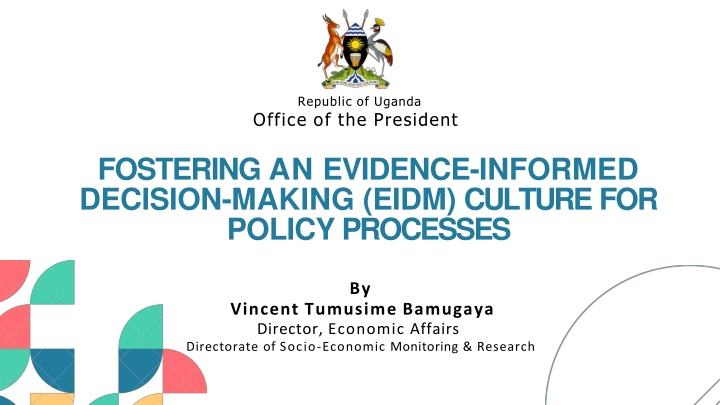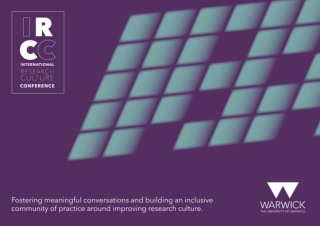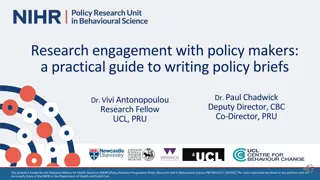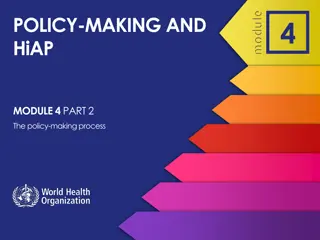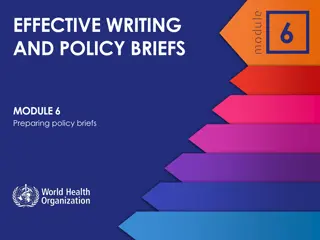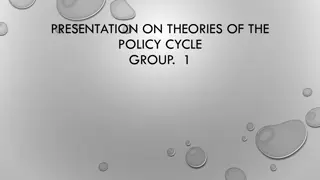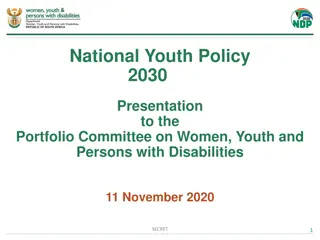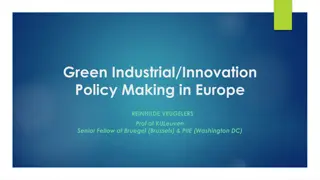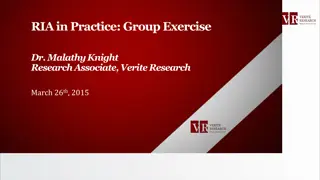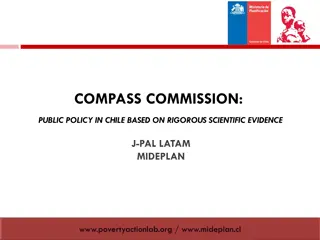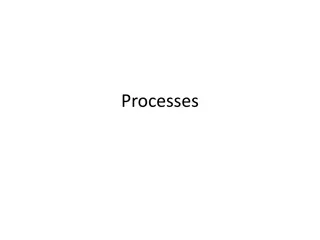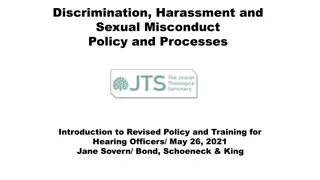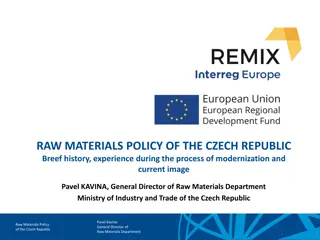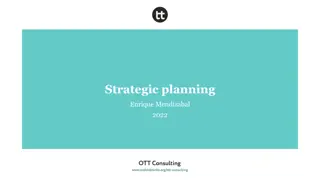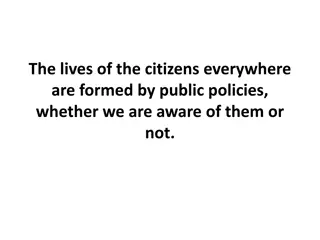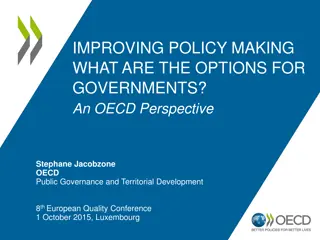POLICY PROCESSES
Presentation focused on evidence-informed decision-making in public policy management, emphasizing the importance of leveraging research evidence for effective policy implementation. It introduces the concept of evidence, discusses the APEX Platform, and highlights the significance of EIDM in achieving optimal resource utilization, good governance, and participatory decision-making.
Download Presentation

Please find below an Image/Link to download the presentation.
The content on the website is provided AS IS for your information and personal use only. It may not be sold, licensed, or shared on other websites without obtaining consent from the author.If you encounter any issues during the download, it is possible that the publisher has removed the file from their server.
You are allowed to download the files provided on this website for personal or commercial use, subject to the condition that they are used lawfully. All files are the property of their respective owners.
The content on the website is provided AS IS for your information and personal use only. It may not be sold, licensed, or shared on other websites without obtaining consent from the author.
E N D
Presentation Transcript
Republic of Uganda Office of the President FOSTERING AN EVIDENCE-INFORMED DECISION-MAKING (EIDM) CULTURE FOR POLICY PROCESSES By Vincent Tumusime Bamugaya Director, Economic Affairs Directorate of Socio-Economic Monitoring & Research
Content 01 02 Introduction Define Evidence and EIDM Importance of EIDM 03 04 05 Case of the APEX PLATFORM APEX Evidence Ecosystem APEX evidence creation domain 06 APEX evidence Application domain 07 Expected Outcomes
Introduction This Presentation is focused on EIDM in Public Policy Management Justification The mandate of Office of the President and Specifically the Directorate of Socio- economic Monitoring and Research is to oversee effective implementation of Government Policies, Programs and Projects and generate evidence based reports to guide Executive decisions. which in line with the Mission of the Office ofthe President is; Provision of overall Leadership in Public Policy Management and Promotion of Good Governance Practices for National Development
WHAT IS EVIDENCE? EVIDENCE-INFORMED DECISION-MAKING Evidence for Policy making is any information policymakers make decisions and get results that are manageable and (Shaxson, 2005). that helps Is a strategic and deliberate method of applying empirical knowledge, research and evidence from Practice and Policy implementation to inform Decision Making concrete, achievable Evidence-informed decision-making aims at ensuring that Public Policies and Programs are informed by the best available research evidence, which is identified and appraised through systematic and transparent processes. Relevant, actionable evidence is the backbone of safe and effective public policies and programmes.
EIDM ..... Investing in strong research in Policy process is of both high intrinsic and instrumental value. Leveraging the best available evidence for effective Public Policies and interventions increases 2 3 1 4 Participatory Decision-Making Accountability Optimal Resource Utilisation Good Governance The failure of Practitioners to link evidence to Policy and Practice, produces Policies/Programmes/Projects that can not be optimally used; impedes innovation, and allows the practice of isomorphic mimicry to thrive.
IMPORTANCE OF EIDM - A CASE FOR PUBLIC POLICY EXECUTIVE OVERSIGHT FORUM (APEX PLATFORM) IN MANAGING FOR RESULTS What is APEX? The Platform (APEX) was approved by Cabinet in 2018 under Minute 482 2018), Decision 4(g). This is Policy convened by the Office of the President Learning and Making based on and Evidence a High-Level Management Public Forum It was adopted under NDP III as a new Reform to Strengthen Executive Oversight of Plan s implementation. (CT for Uptake, Decision Research
APEX PLATFORM OVERSIGHT GOALS To Leadership in Public Policy Management and Promotion of Good Governance for Results. Provide Effective APEX PLATFORM To evidence focused recommendations in aiding Executive Decisions to address implementation Economic Interventions facilitate utilisation based of action- effective Socio- of Development
WHY THE APEX PLATFORM Levels Executive Planning & Budgeting Implementation Executive Oversight Rush for Function; O.P Strategic Coordination Operationalization Level 9/3/23 8 APEX
APEX Evidence Ecosystem: Turning Evidence Into Action evidence can system formal An ecosystem defined as a be the reflecting and informal l inkages and interactions between actors ( and capacities resources) involved in the production and use of evidence Evidence Application APEX evidence ecosystem includes the two domains Evidence creation different their and
APEX EVIDENCE ECOSYSTEM ACTORS OP MOFP ED and The adoption policies and depends evidence actors that are part of the APEX evidence ecosystem include; formulation of LGS effective programmes on a functional ecosystem. The OPM MDAS NPA Private Sector, Devpt Partners, Civil Society Organisations, Researchers and citizenry UBOS ISO
APEX EVIDENCE GENERATION DOMAIN 5. Pre - APEX & Steering Committee Meetings The evidence creation domain consists of a number of phases: 1. Primary Research EVIDENCE BASED 4. Evidence . RECOMMENDATIONS A mix regular understanding between the actors of the APEX ecosystem supports Primary, Secondary and tertiary evidence production and enhances synergy in the use of research evidence. of tools dialogue and methods, and in-depth synthesis 2. Secondary Research 3. Independent Studies by OPM, MoFPED, NPA, UBOS, OWC, ISO
APEX EVIDENCE ECOSYSTEM FOR IMPACTFUL RESULTS FRAMEWORK Understanding the Problem Pertinent Policy Framework What is required to be achieved? In what Design and How? Under what Baseline? Resource Implication? What are the Problems? What are the Causes? What are the Alternative Feasible Options? Planning Design Budgeting Diagnosis Conceptualization Strategic Coordination for Effective Implementation Result Analysis Intended Outcomes To what extent are the results attained? Impact Analysis Coordination of MDAs, DLGs & Other Key Stakeholders Implementation M&E Mechanisms for Performance Mgt
To effectively implement the APEX framework and strengthen the interconnections between stakeholders, three cross-cutting activities are of vital importance. Capacity-building at different Levels Continuous communication interactions and collaboration among the stakeholders Cross-cutting activities Building relationships, trust and mutual respect
Principles There are a number of principles that are explicitly included in the work of APEX PLATFORM Needs- based approaches Every stage of the APEX framework ( both in evidence creation and application) the needs of the target audience at the national or local level considered. 01 Use of systematic and transparent processes 02 I nclusive approaches The perspectives of diverse stakeholders are incorporated in the APEX framework to develop evidence- based Recommendations. 03 Integration APEX framework are conceived as a benchmark and can be applied at any policy/ programme/ Project aimed at promoting the use of evidence in decision- making processes for impactful results. The methods of 04
THE APEX EVIDENCE APPLICATION DOMAIN On the evidence user side, a range of activities are done to enhance application of the evidence to achieve the intended goal of the APEX Platform . Evidence is also produced as part of the process to help achieve the desired impact of the Policies/Programmes/Project In the evidence application process Evidence generated by APEX is used as an input 01 02
EXPECTED OUTCOMES OF APEX Enhanced Public Accountability for Results A /Harmonized Framework for best practices to address Socio-Economic Development Challenges. Standardized Increased use of Evidence and Results based information to guide Executive Decisions Internal and External Synergies in the Management for Results Strengthened. Utilization and Non- Actors Increased of State State Actionable Recommendations in the Oversight sphere. Executive
